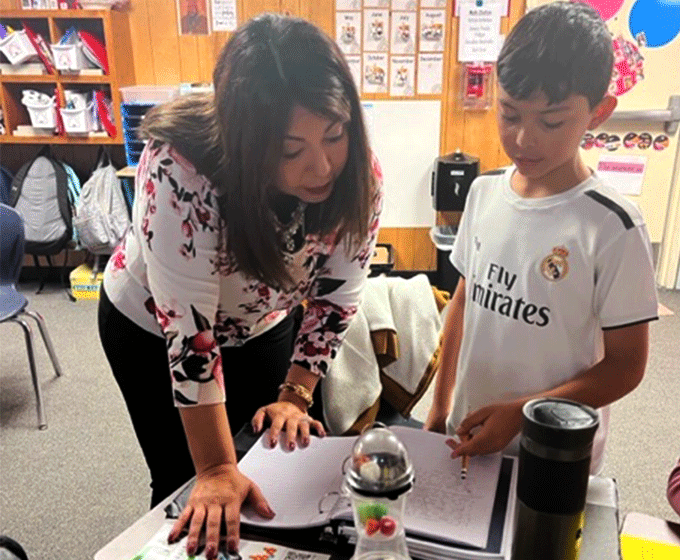
DECEMBER 8, 2022 — Guadalupe Veliz wasn’t afraid to leave behind a successful corporate career to become the educator she and her family needed when they moved to the United States.
On Tuesday, Veliz will graduate with a doctorate degree in educational leadership from the UTSA College of Education and Human Development, more prepared than ever to perform her duties as associate principal of Nathan Kallison Elementary School in San Antonio.
“It certainly doesn’t feel like a job,” Veliz said of her second career.
Veliz, 46, left the corporate world after about a decade, having graduated from Dartmouth College with her undergraduate degree in Latin American and Caribbean Studies. She wanted to work in a South or Central American country and follow a corporate career path back to the U.S., but she ended up back in Texas after graduation, working in investment services and financial planning.
In 2010, Veliz made the switch to education. She found the transition into the classroom “to be a very meaningful profession right from the get-go,” but the learning curve felt steep with no undergraduate degree in education. That’s when she decided to earn a master’s degree in education from UTSA and now a doctorate degree in educational leadership.
Veliz focused her dissertation on finding out how immigrant parents receive information about school programs from educators and the challenges they may face, drawing on her own experience as the child of Mexican immigrant parents. While Veliz was born in Texas, she spent her early childhood in Sabinas Hidalgo, a city in the Mexican state of Nuevo León. Her family later moved to San Antonio, where she graduated from Lanier High School, but because her parents only spoke Spanish, Veliz found herself as the “cultural broker” during meetings with educators.
“Being a voice for others who have had similar experiences to mine, that’s a privilege that I couldn’t have asked for, and even this opportunity to pursue this dissertation, I just realized how fortunate I am to have gotten this far in my educational trajectory,” Veliz said. “For me, it’s even more impactful to pass that on, to foster that in others who want to pursue that same path.”
Veliz said immigrant parents already face many barriers related to language and employment when it comes to Texas school systems. Her dissertation embarked on finding out how educators disseminate information to the people who most need it, such as immigrant parents.
“In some of the literature, our immigrant parents are painted as these passive recipients of information,” she said. “What I took away from my study with the parents that I interviewed was really their agentic power and that agency that they demonstrated in spite of the reality of their situation, being immigrant parents.”
Veliz found that immigrant parents relied more on their social networks to foster the flow of information from schools than on school leaders or newsletters to find out about programs and services their children may need.
“The implication for school leaders is to really create those opportunities and to have those concrete settings where those type of interactions can take place and be fostered at the school level, instead of just them finding it through a Facebook page or through a neighborhood connection, being more deliberate about providing those opportunities,” she said.
But the connections Veliz made with the diverse group of professors she had at UTSA helped her foster and engage with the ideas that materialized through her dissertation. She’s not sure she would have found the same kind of support at any other university.
“I found professors who shared similar stories, who have immigrant backgrounds, who were able to speak to the way that they understood our issues in education and how they as practitioners had addressed those issues,” she said. “It takes so much mentorship for something like this to come to fruition that I think that has been the most meaningful part for me at UTSA — the professors.”
UTSA Today is produced by University Communications and Marketing, the official news source of The University of Texas at San Antonio. Send your feedback to news@utsa.edu. Keep up-to-date on UTSA news by visiting UTSA Today. Connect with UTSA online at Facebook, Twitter, Youtube and Instagram.
Move In To COLFA is strongly recommended for new students in COLFA. It gives you the chance to learn about the Student Success Center, campus resources and meet new friends!
Academic Classroom: Lecture Hall (MH 2.01.10,) McKinney Humanities BldgWe invite you to join us for Birds Up! Downtown, an exciting welcome back event designed to connect students with the different departments at the Downtown Campus. Students will have the opportunity to learn about some of the departments on campus, gain access to different resources, and collect some giveaways!
Bill Miller PlazaCome and celebrate this year's homecoming at the Downtown Campus with food, games, giveaways, music, and more. We look forward to seeing your Roadrunner Spirit!
Bill Miller PlazaThe University of Texas at San Antonio is dedicated to the advancement of knowledge through research and discovery, teaching and learning, community engagement and public service. As an institution of access and excellence, UTSA embraces multicultural traditions and serves as a center for intellectual and creative resources as well as a catalyst for socioeconomic development and the commercialization of intellectual property - for Texas, the nation and the world.
To be a premier public research university, providing access to educational excellence and preparing citizen leaders for the global environment.
We encourage an environment of dialogue and discovery, where integrity, excellence, respect, collaboration and innovation are fostered.